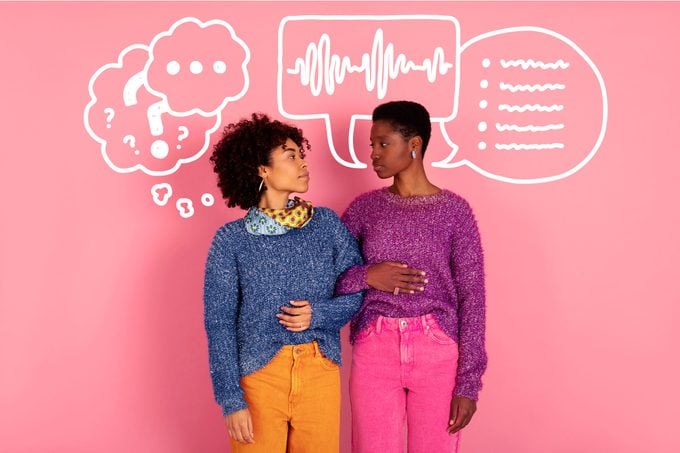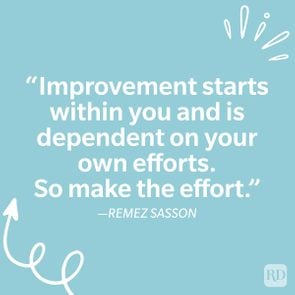Self-Awareness: What It Is and How It Helps You Get Ahead
Updated: Dec. 08, 2023

Understanding yourself better helps you play to your strengths. Here's how you can improve your sense of self-awareness.
Living alone during the height of the pandemic shutdowns in spring 2020, I had a lot of time on my hands for personal reflection. I may not have wondered what is self-awareness? before, but I certainly spent a lot of time thinking about it back then.
It took a lot of emotional strength to soul search—and there’s little question I was self-criticizing far too often. Isolation had me living in my head way, way, way too much. But looking back, I realize I gained some useful insight about myself during that time that helped me become what I think is a better version of myself. Which is pretty much exactly what self-awareness is and what it’s supposed to do.
Experts say that people who have a keen sense of self-awareness can interpret their actions, feelings and thoughts effectively. They can even be more confident and creative. The funny thing about it, though, is that we all seem to think we’re self-aware, even when we’re not. According to organizational psychologist Tasha Eurich, only 10% to 15% of people actually fit the criteria for being self-aware. Most of us have a lot of catching up to do. And even if you are self-actualized—congratulations on that, by the way—it never hurts to check in on how your thoughts and feelings influence your behaviors and how you’re perceived by others.
Get Reader’s Digest’s Read Up newsletter for more confidence tips, humor, cleaning, travel, tech and fun facts all week long.
What is self-awareness?
Merriam-Webster defines it this way: an awareness of one’s own personality or individuality. But psychology experts dig a little deeper.
“Self-awareness is our recognizing and understanding of our own thoughts, emotions and behaviors, including their underlying causes and effects, as well as our intrapersonal and interpersonal strengths and struggles,” says Larry Marks, PhD, a licensed psychologist at the University of Central Florida Counseling and Psychological Services. Sound a bit like emotional intelligence? That’s because self-awareness is a key element of it.
And even that is just skimming the surface—there’s more than one kind of self-awareness too.
What are the two types of self-awareness?
Self-awareness can be both internal and external—both private and public, if you will. “I think private self-awareness is knowing what we’re thinking or feeling that may not be known to or seen by others,” says Marks. “Whereas public self-awareness is knowing how we are viewed by others.”
Here’s more detail about both of those categories:
- Internal self-awareness: This is being able to notice and reflect on your internal state of mind. Maybe you know that you’re not a morning person or that your feelings get hurt easily or that you’re very competitive. People with private self-awareness are often introspective people.
- External self-awareness: What is self-awareness in the public sense? It’s recognizing what other people think about us. Experts say that people who have a good sense of this may be more likely to adhere to social norms and behave in socially acceptable ways. And while it’s good to get a reality check about what the people in our lives think about us, it’s easy to get caught up in fretting too much about what others think of you.
Why is self-awareness so important?
Well, for starters, it’s extremely useful to know if other people think you’re a selfish jerk—particularly if you don’t believe that you fit that description at all. It’s also a solid plan to understand your own behaviors and reactions a little more clearly and make any necessary tweaks that you can.
When done the right way, self-awareness is a key component of both personal and professional growth. Research suggests that when we see ourselves clearly, we are more creative, have higher self-esteem, make better decisions, have stronger relationships and are better communicators. “Self-awareness leads to self-improvement,” says Marks.
That same research found that we’re also more effective in our work lives. People who are self-aware get more promotions, are better leaders, have more satisfied employees and work for more profitable companies. Recognizing the effect we have on others has a serious payoff.
Whether you want to learn how to stand up for yourself at work or boost your self-confidence, your first step is to improve your self-awareness.
How to improve your self-awareness
Once you have a handle on what is self-awareness and what isn’t, consider whether you could do with some self-reflection. Just as businesses and organizations may do a review of their goals and strategies, you can do a gut check on your feelings, priorities and behaviors too. Here’s how.
Ask yourself some hard questions
Have a little internal dialogue with yourself, even if it may be difficult to accept the answers. Sometimes knowing yourself takes stepping outside your comfort zone.
If a situation didn’t go the way you wanted it to, think to yourself, What was my role in that situation going well or having problems? An extremely wise friend once told me that if there are multiple problems going on in someone’s life, that person is the common denominator for all of them.
So if nothing ever seems to go your way, there’s a fairly decent chance you play a significant role in that fate. Recognizing that can be rough, but once you do, you’ll be better equipped to rectify things.
Check in with your friends and family

If you’re hoping to boost your external self-awareness, you need honest input from the people in your life. Positive change and self-improvement can grow within the context of our relationships with others. “Being open to sharing with trusted family, friends and co-workers, and talking things through, often leads to insights,” says Marks.
And remember, even if it’s not always easy to hear their critiques, it’s always important to hear them out.
“Listen to both what people value about you and what people think are your areas of growth,” says Marks. “Even if it’s not always pleasant to hear, view this feedback as an opportunity to learn and improve. It’s especially helpful to take in comments that we have heard repeatedly.”
In other words, if several of your friends have said you can be judgmental, it’s time to take action.
Replace “why” with “what”
In 2020, I was spending way too much time doomscrolling, which was terrible for my already fragile mental health. I snapped out of it, realizing I could spend my time in better ways. So instead of asking myself why I felt so bad, I started asking what would make me happier. That’s when I started listening to reggae music. Tropical vibes and a don’t-worry-be-happy beat always make me smile. (Fortunately, I am at least self-aware enough to know that much.)
As Eurich told an audience at the National Institutes of Health, “most of us ask ‘why’ when we should be asking ‘what.'”
Does giving a presentation at work put knots in your stomach? Instead of asking why it stresses you out, ask yourself what level of planning or what public-speaking tips would give you more confidence. Have you been feeling down? Uplifting music may not be your spark for joy, but use your self-reflection time to figure out what is. Being aware of what brings you happiness can help you manifest it.
Keep a journal
We hear this tip as a strategy to improve a lot of things in our lives, and for good reason. It works. “Writing down our experiences helps us reflect on our thoughts and actions over time,” says Marks.
Maybe it’s finally time to start a gratitude journal to help you keep track of your good fortune and thoughts for self-improvement. Another tried-and-true mindfulness strategy is meditation, which helps you tune out the rest of the world and focus on your internal self.
Talk to a mental health pro
If reflecting on your goals, actions and intentions is getting you nowhere on your own, it may be time for an expert assist. “People also can consider working with a mental health professional or personal coach who is skilled at helping individuals increase their self-awareness, as well as [understand] what actions or decisions they may want to take based on these insights,” says Marks.
Expert insight may also help you feel safer and readier to try new ways of perceiving yourself. “If left to one’s own ways of poorly understanding how one affects oneself and others, mental health issues can develop,” says Barbara Becker Holstein, a positive psychologist and author of The Enchanted Self: A Positive Therapy. If you’re not aware of your perfectionism, for instance, you may not realize how critical you’re being of yourself and others, and you could set yourself up for stress and anxiety. A mental health professional could help you recognize your perfectionism and curb harmful habits, like comparing yourself to others.
Don’t be too hard on yourself
Introspection allows us to grow and become better versions of ourselves. Unless you’re like the pandemic version of me, who at times second-guessed every decision she ever made and wondered late at night if her friends thought she was unbearable. Neither of those anxiety-triggered mental loops were productive—or a realistic portrait of who I am.
So there does seem to be a point, at least in my case, where too much introspection can become counterproductive. But Marks has this advice to offer to all of us: “Self-reflection is not supposed to be self-criticism but an opportunity to be curious and open-minded about what contributes to our happiness and troubles.”
So don’t judge yourself too harshly. And if you’re reading about self-awareness at all, you’re already on the road to improving it.
About the experts
- Larry Marks, PhD, is a licensed psychologist at the University of Central Florida Counseling and Psychological Services. He has more than 20 years of experience assisting individuals and groups in improving their well-being and achieving their personal goals. He has a private practice that provides counseling and coaching.
- Barbara Becker Holstein is a positive psychologist and the originator of the Enchanted Self, a positive psychology method for increasing happiness. She is the author of The Enchanted Self: A Positive Therapy.
Sources:
- Merriam-Webster: “Self-Awareness”
- NIH Record: “Eurich Explores Why Self-Awareness Matters”
- Journal of Social and Clinical Psychology: “Self-Awareness and Constructive Functioning: Revisiting ‘the Human Dilemma'”
- The Journal of Experimental Education: “Self-Regulated Learning: The Interactive Influence of Metacognitive Awareness and Goal-Setting”
- European Journal of Training and Development: “A longitudinal, mixed method evaluation of self-awareness training in the workplace”



